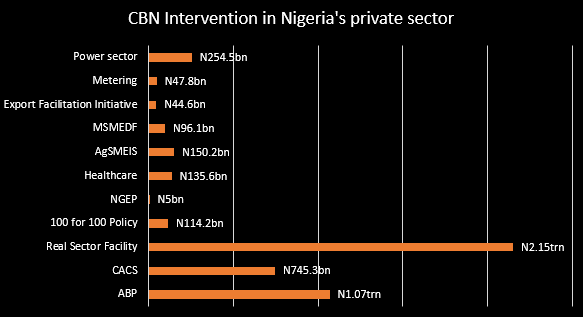Data from the Central Bank of Nigeria has shown that the apex bank has discontinued its intervention programme for the real sector of the economy which had hit N4.81 trillion as of November 2022.
According to the communique of the recently concluded monetary policy meeting held on the 23rd and 24th of January 2023, the real sector intervention as of January 2023 remained unchanged compared to November 2022.
This followed the move by the CBN to aggressively combat the rising inflation by mopping up excess liquidity in the Nigerian economy.
Breakdown of CBN’s intervention: The apex bank has disbursed a cumulative sum of N1.07 trillion to over 4.6 million smallholder farmers cultivating or rearing 21 commodities across the country under the Anchor Borrowers’ Programme (ABP).
- The Bank also released N745.31 billion to finance 680 large-scale projects in agro-production and agro-processing under the Commercial Agriculture Credit Scheme (CACS).
- In addition, the Bank has disbursed N2.15 trillion for 437 projects across the country, comprising 240 in manufacturing, 91 in agriculture, 93 in services, and 13 mining sector projects, under its N1 trillion Real Sector Facility.
- Under the 100 for 100 Policy on Production and Productivity (PPP), the Bank has disbursed a cumulative sum of N114.17 billion to 71 projects in healthcare, manufacturing, services, and agriculture.
- CBN has disbursed a sum of N44.58 billion under the Export Facilitation Initiative (EFI), to fund export-oriented projects.
The Bank has released N5.00 billion under the Intervention Facility for the National Gas Expansion Programme (IFNGEP) to promote the adoption of compressed natural gas (CNG) as the preferred fuel for transportation and liquefied petroleum gas (LPG) as the preferred cooking fuel.
Under the Agribusiness/Small and Medium Enterprise Investment Scheme (AgSMEIS) and Micro, Small, and Medium Enterprise Development Fund (MSMEDF), to support entrepreneurship development in the country, the bank has disbursed a sum of N150.22 billion and N96.08 billion, respectively.

Why the pause: The Central Bank of Nigeria has grappled with a problem of rising currency in circulation in the country, with the most worries being the monies outside the reach of the banks.
- The CBN disbursed a significant amount of funds in the wake of Covid-19 in 2020, which saw the currency in circulation rise from less than N2 trillion to over N3 trillion in just two years and the money supply to an unprecedented level. This movement is believed to be fuelling the rising rate of inflation.
- The apex bank in a bid to curb the rate of inflation raised the benchmark interest rate (MPR) by a cumulative 500 basis points last year, which yielded less than desirable results. Hence, the CBN sought to reduce the amount of money supply and currency outside the banking system by reducing its economic intervention.
- The new naira notes policy has also served the bank’s objective of recovering a large chunk of the funds being held by individuals, which has rendered monetary policy tools less potent against inflation.
75% success rate actualized: The Central bank has noted that it has recovered a sum of N1.9 trillion from the N2.7 trillion held outside the banking system through its new naira note policy as well as the cash swap initiative.
- The N1.9 trillion recovered represents about a 75% success rate. According to Emefiele, the governor of the central bank, the aim of the initiative is to make monetary policy decisions more efficacious in taming the inflation rate in the country.
- “So far and since the commencement of this program, we have collected about N1.9 trillion; leaving us with about N900 billion (N500 billion + N1.9 billion), Emefiele said in a press briefing on Sunday, 29th January 2023.”
















